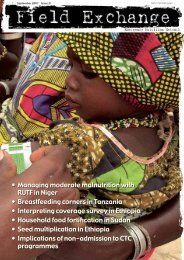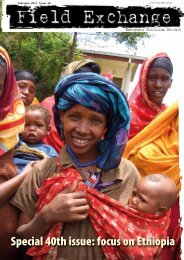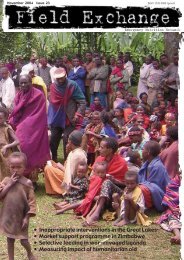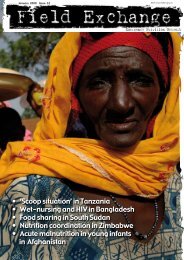Drought resistant 'banana' - Field Exchange - Emergency Nutrition ...
Drought resistant 'banana' - Field Exchange - Emergency Nutrition ...
Drought resistant 'banana' - Field Exchange - Emergency Nutrition ...
You also want an ePaper? Increase the reach of your titles
YUMPU automatically turns print PDFs into web optimized ePapers that Google loves.
News & Views<strong>Nutrition</strong> inemergenciesworking group,SCN 2004At the 31st Standing Committee on<strong>Nutrition</strong> (SCN) session held recentlyin New York (21-25 March, 2004),progress of the <strong>Nutrition</strong> inEmergencies Working Group (NEWG) wasreviewed. Chaired by Saskia van der Kam(Médecins Sans Frontières), work was presentedin six subject areas (theme groups). The contributionof the NEWG activities to the realizationof the Millennium Development Goals, thecentral theme of the 31st session, was also consideredat the meeting.Adult malnutritionBradley Woodruff (CDC) and Jane Knight(University of Aberdeen) presented a joint researchinitiative by University of Aberdeen(leading), Partners Research <strong>Emergency</strong><strong>Nutrition</strong> (PREN), the Humanitarian ScientificAdvisory Group (including ENN, CDC,Epicentre) and the NGO Support Group. Thestudy aims to explore and develop a model toincrease the generalisability and robustness ofcurrent indicators of severe adult malnutritionduring complex emergencies, by literaturereview (published and unpublished) and analysisof data including context. Agencies wererequested to forward any related informationincluding reports, raw data, patient cards,surveys and articles.Community based therapeutic care (CTC)Kate Sadler (Valid International) outlined theconsiderable progress made in managing severemalnutrition in a community setting. Workingplans for this group are to consolidate communitytreatment of severe malnutrition, includingan intervention framework, and to develop anapproach to managing severely malnourishedinfants.Food securityRita Bhatia (WFP) outlined WFP’s goals forfood aid in emergencies including plans to integrateeducational support and gender disparityreduction into programming. WFP is also examiningthe efficacy of in country fortification offood aid in order to improve ration quality.Fathia Abdallah (UNHCR) and Andrew Seal(Institute of Child Health, London) outlinedhow UNHCR is investigating micronutrientdeficiency assessment methods, improvingmicronutrient supplementation (specifically theuse of iron cooking pots to increase the ironconsumption), and the development of nutrientanalysis software. In addition, several NGOs areinvestigating ways of fortifying food rations ofinternally displaced populations, refugees andpeople living with HIV/AIDS. Research onpersistent micronutrient malnutrition in longtermAfrican refugees was also presented, whichfound a high prevalence of anaemia and irondeficiency associated with dietary iron insufficiency,and vitamin A deficiency. A key recommendationwas to include simple methods ofmicronutrient surveillance in routine operations.Care practices in emergenciesCare practices in emergencies were highlightedas an underdeveloped sector amongst agenciesworking in emergencies. Cecile Bizouerne(ACF) presented research findings from Sudanand Afghanistan, which explored mental andsocial issues in caring practices.Recommendations included compiling informationon the type of mental and social supportgiven by agencies in nutritional programmes,and using these to inform how we can adaptways to address care practices in emergencies.Marie McGrath (ENN) presented an updateon training materials on infant feeding in emergencies,on behalf of a core inter-agency groupinvolved in their development . Module 1, InfantFeeding in Emergencies, for relief staff, has beenevaluated and is being widely used as resourcematerial and in training. Module 2, whichtargets health and nutrition workers, has a greatertechnical content and is nearing completion,including sections on managing malnourishedinfants under six months, and artificial feedingin emergencies. Plans include targeting andevaluating both modules, and identifyingfunding resources to develop a third trainingmodule, on complementary feeding in emergencies.Gaps in the evidence base for managingsevere malnutrition in infants under six monthswere highlighted 1 .<strong>Nutrition</strong> and diseaseIn view of the the many emerging issues andinitatives relating to nutrition and HIV/AIDS, itwas decided that a representative of the nutritionin emergencies working group join the<strong>Nutrition</strong> and HIV/AIDS working group, toencourage a working link between the twogroups.Capacity developmentAwritten update on capacity developmentfor nutrition in emergencies was submitted byAnnalies Borrel (Tufts University). This includeda list of available courses, which have a focus onemergency nutrition, and is available on<strong>Nutrition</strong>Net (www.nutritionnet.net), and willbe updated in June 2004. Other initiatives includethe publication of the second edition of theSphere manual, and the ongoing SMART project.Plans for the SCN 2005The NEWG will be chaired by FathiaAbdallah (UNHCR) and Caroline Wilkinson(ACF France). Each of the theme groups whichcomprise the working group are represented bya focal person(s). In 2005, a larger meeting isplanned just before the SCN annual meeting, asthere are many issues to be discussed in depth.For further information or to contribute to theactivities of the working group, contact FathiaAbdallah, email: fabdallah@unhcr.org orCaroline Wilkinson, email: ecw@acf.imaginet.frAfull report on the NEWG meeting can befound at http://www.unsystem.org/scn/1See http://www.ennonline.net for fuller update on infantfeeding in emergencies activities presented at SCNNew MeasuringScoops for F75TherapeuticMilkTo respond to frequent requestsfor measuring scoops for thepreparation of small quantitiesof F-75, Nutriset with theapproval of UNICEF, are includingmeasuring scoops in every carton of F-75.The Nutriset measuring scoops arered with the NUTRISET logo printedon the handle.Preparation of F75 therapeutic milkusing the red NUTRISET scoop:Mix one level measuring scoopful ofNutriset F-75 therapeutic milkpowder in with 20 ml of water.This dilution is only valid for F75.To dilute Resomal or F100 therapeuticmilk using the red scoop, a differentdilution is required. For further informationon dilutions, contact ChristelleLecossais, Product Manager,email: clecossais@nutriset.frECOWAS <strong>Nutrition</strong> Forum on<strong>Nutrition</strong> and HIVThe West African Health Organization(WAHO), a specialist agency of ECOWAS(Economic Community of West AfricaStates), will hold its 9th Annual ECOWAS<strong>Nutrition</strong> Forum, from the 20-24 September, 2004in Cotonou, Benin. The Forum brings togethernutritionists from the 15 member states ofECOWAS, and partners who support the forum.The main objectives of the forum are to:• Develop common, pertinent and appropriatestrategies for preventing nutritional problemsin the ECOWAS sub-region• Promote information and experience exchangeamongst nutrition actors, and the operationalisationand strengthening of nationalnutrition networks in ECOWAS member states.The forum devotes a day to providing a technicalupdate for participants on a pertinent nutritionissue in the region. The technical theme for thisyear’s forum will be “<strong>Nutrition</strong> and HIV/AIDS”.In spite of considerable efforts made in the managementof persons living with HIV/AIDS(PLWHA), the prevention of mother-to-childtransmission of the HIV virus and access to antiretroviral drugs, the involvement of nutritionistsin the planning and implementation of nationalAIDS control programmes remains relativelyweak.The technical update sessions will:• Provide participants with the most recentscientific and political orientations around thesubject of nutrition and HIV• Facilitate exchange of experience, best practiceand lessons learned among actors andpartners working on the theme• Identify strategies for strengthening thecapacity of nutritionists in the region insupport of national AIDS control programmes,specifically in relation to providing nutritioncare and support for PLWHA and preventingmother-to-child transmission of the disease.For more information, contact: Dr Ismael Thiam.WAHO <strong>Nutrition</strong>/Child Survival Specialist,WAHO, 01 BP 153 Bobo Dioulasso, Burkina Faso.Tel 226-97-57-75, Fax: 226-97-57-72,E mail: ismaelthiam@hotmail.com orwahooas@fasonet.bfhttp://www.nutritionecowas.org.In Benin, contact: Dr Raima Moudachirou,National <strong>Nutrition</strong> Focal Point of Benin,E mail: imamoudachirou@hotmail.com16
















